The Physikalisch-Technische Bundesanstalt (PTB), Germany's national metrology institute, in cooperation with the Technische Universität Ilmenau, has verified the suitability and accuracy of an optical power measurement method based on photon pulses. The results of the optical power measurement via photon recoil were compared with those via a calibrated reference detector and attest to the great potential of the novel measurement technique for high optical powers in the kilowatt range, which are required in industrial manufacturing, for example.

The measurement system developed and built by the scientists uses a novel measurement technique that enables the precise generation of very small forces via photon pulse measurement as well as laser power measurement with direct feedback to the Planck constant of the SI system of units. Planck's quantum of action, or Planck's constant, is one of the fundamental constants of nature (such as the speed of light) and describes the smallest possible amount of energy that has been theoretically known since the quantum revolution in physics in the last century. Dr. Suren Vasilyan, a research associate at TU Ilmenau, carried out the developments together with Prof. Thomas Fröhlich, Prof. Eberhard Manske and Norbert Rogge at the Institute for Process Measurement and Sensor Technology. The research team, which was already involved in the development of the world's first industrial scale for the "new kilogram," the Planck scale, is enthusiastic about the results, as Dr. Vasilyan says:
Two completely different use cases emerge from our investigations, which at first glance have nothing in common and encompass different fields of physics and engineering.
High-precision measurement and calibration processes
First, the new method can improve the accuracy of optical power measurements of high-power laser systems, which are typically used in various ranges at 100 watts to several 10 kilowatts. For this purpose, a new class of high-power optical detector systems is already being planned and developed, as Dr. Vasilyan explains:
The simplicity of the concept has already attracted the interest of many world-class researchers and institutions, since the expected results of optical power measurement for 1 kilowatt of laser power, for example, are more than a hundred times better than the conventional measurement methods currently in use, where improvements have been stagnant for several decades.
On the other hand, the new measurement method can be used to generate very small calibration forces for pico- and nanopower measurements (pN, nN) or the measurement of very small masses. The optical power of the lasers is proportional to the force value and can be measured very accurately with conventional thermal reference detectors.
For the metrological investigations, scientists at the Institute of Process Measurement and Sensor Technology have developed a portable force measurement setup consisting of two high-quality electromagnetic force compensation precision balances and an optical cavity made of mirrors with nearly ideal reflectivity. For example, twenty reflections of the laser beam with only 1 watt of laser power produce forces of several hundred nanonewtons. In contrast, the forces generated by a single laser light reflection are on the order of only a few nanonewtons. Dr. Vasilyan explains:
This provides better control over the high-precision measurement and calibration processes. Combined with our other state-of-the-art metrology systems, it opens the way to the realms of quantum mechatronics.
(Kopie 19)
Dr.-Ing. Suren Vasilyan
Institute of Process Measurement and Sensor Technology

